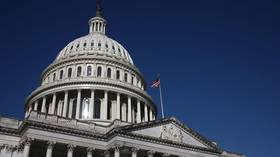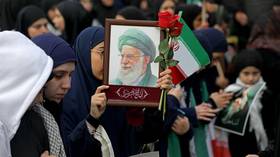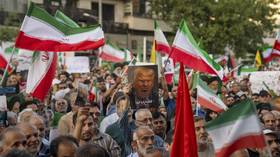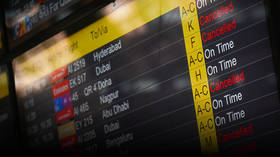What are EU's chances of surviving without Russian gas?
Supplies to Poland and Bulgaria have been cut off after they refused to pay in rubles
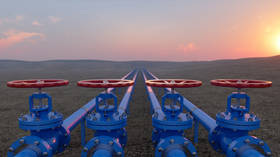
On Wednesday, Russian energy giant Gazprom halted gas supplies to Bulgaria and Poland via the Yamal-Europe pipeline for not complying with the mandate to pay in rubles. It is the first supply disruption since Russian President Vladimir Putin demanded “unfriendly countries” pay for natural gas in Russian currency from April 1 or risk being cut off from vital supplies.
- How will EU countries cover the supply shortfall?
The European Union reportedly plans to significantly increase purchases of Russian gas through states that are ready to pay in rubles to compensate for the shortfall in supplies to Poland and Bulgaria. The so-called ‘reverse flow’ mechanism could allow the two countries to boost imports from their neighbors in the short-term. Liquefied natural gas (LNG) imports could be another option, but there is a limit to how much LNG suppliers can produce and transport. Moreover, the global liquefaction capacity is almost fully utilized, experts say. Some EU countries have no alternative as they are landlocked and therefore unable to receive shipments. According to experts, those options won’t be able to help the EU members replace any missing supplies from Russia. - What is Gazprom’s position?
The Russian energy giant has made it clear that the suspension of gas supplies would persist until the payments are made in rubles. Gazprom warned both Poland and Bulgaria, which are transit states, against any “unauthorized withdrawal” of gas supplies flowing through their territories. Otherwise, supplies for transit will be “reduced by this volume.” - How has the EU responded?
The European Commission has accused the Russian company of contract breach, describing the decision to halt supplies as attempted “blackmail.” Brussels said it was coordinating a response among EU member states. - What does the cut-off mean for Poland and Bulgaria?
Both countries heavily rely on Russian natural gas. Supplies from Gazprom cover about 50% of Poland’s consumption and about 90% of Bulgaria’s. According to the Federal Customs Service of Russia, gas supplies to Poland increased by 9.4% in 2021 to 10.58 billion cubic meters. Deliveries to Bulgaria have doubled to 3.15 billion cubic meters. Polish officials say the country has sufficient gas reserves and there will be no shortage of gas in Polish homes as its gas storage was 76% full. Bulgaria’s government also said there would be no domestic restrictions on consumption, pointing out that supplies to customers were guaranteed for at least another month. Both countries are also trying to boost LNG imports. - Could the halted imports be restored?
Gazprom said supplies would resume once the payments in Russian currency were made. The new payment mechanism allows buyers to pay in their currency of choice, but they must open up a ruble account in Russia’s Gazprombank so that the payments can be converted into rubles and reach Russian gas providers. - Which European countries are most dependent on Russian gas?
The engines of the continent’s overall economy – Germany, Italy, and France – are the biggest EU importers of Russian gas. Germany imports around half of its gas from Moscow, while France gets a fifth of its supply, according to the latest data by Statista. Italy is also among the major consumers, relying on Russia for 46% of its imported gas. Some smaller European countries, such as North Macedonia, Bosnia and Herzegovina, and Moldova rely exclusively on Russian energy. Finland and Latvia get 90% of their gas supply from Russia, and Serbia 89%. - Is anyone willing to pay rubles for gas?
Despite their heavy reliance on Russian energy, some of the EU buyers have rejected the Kremlin’s payment terms. However, others, like Austria and Hungary, say they have accepted the new mechanism and are ready to abide by it. Hungary’s next payment obligation for Russian gas is due in mid-May, and the country will transfer its payment in euros to Gazprombank, where the amount will be converted into rubles, the country’s foreign minister said. Meanwhile, Bloomberg reported on Wednesday, citing sources close to the Russian gas giant, that ten European companies have already opened ruble accounts at Gazprombank. Four European gas buyers have paid for the supplies in Russian currency, the sources said. - What happens if they refuse?
President Putin has clearly demanded that buyers from ‘unfriendly’ countries pay for gas in rubles or be cut off, starting from the date payments are due for April. “If such payments are not made, we will consider this a default on the part of buyers, with all the ensuing consequences. Nobody sells us anything for free, and we are not going to do charity either – that is, existing contracts will be stopped,” he said last month. - Can Europe replace Russian gas?
It won’t be an easy task, economists say, noting that doing so would require major changes. The European Union relies on Russian natural gas to heat homes, cook meals, and generate electricity in most of the bloc’s 27 member states. Weaning Europe off of cheap and abundant Russian gas would be a far more disruptive prospect, experts warn. Some EU officials acknowledged that a sudden shift from Russian energy would be hard, causing a recession and inflation in the European economy.
For more stories on economy & finance visit RT's business section
You can share this story on social media:
Please check our commenting policy. If you have questions or suggestions feel free to send them to feedback@rttv.ru.



